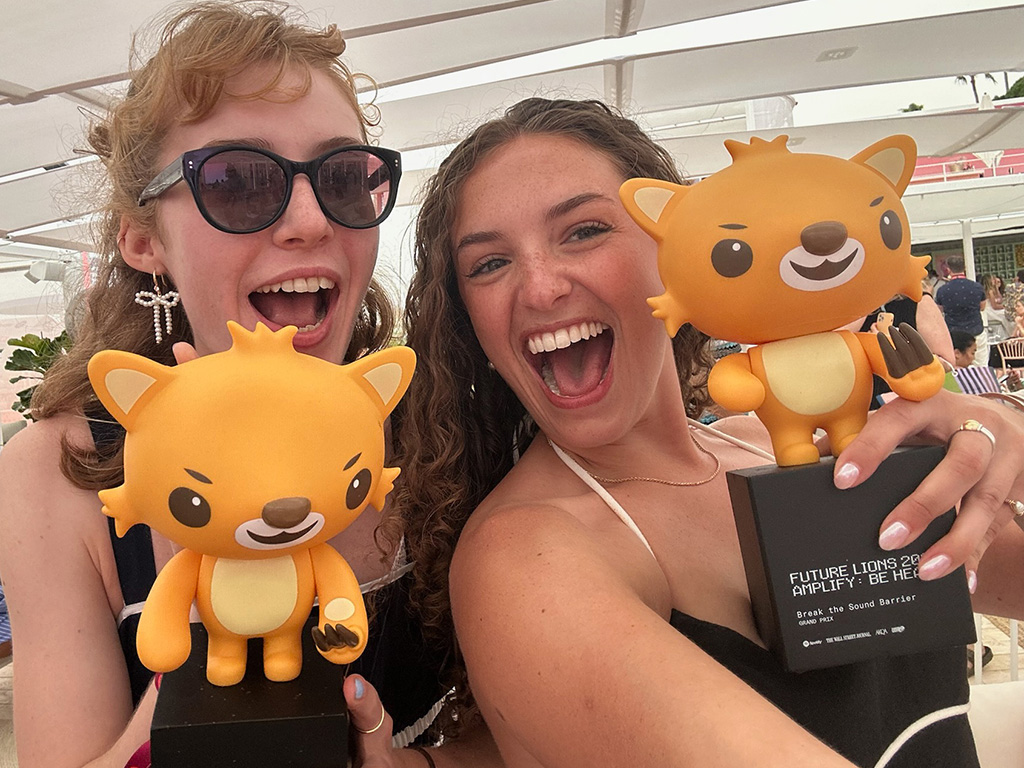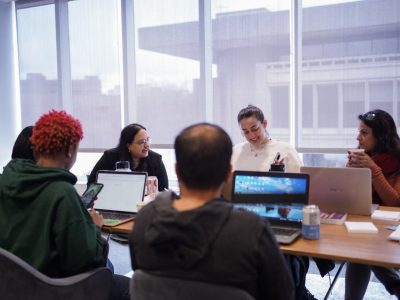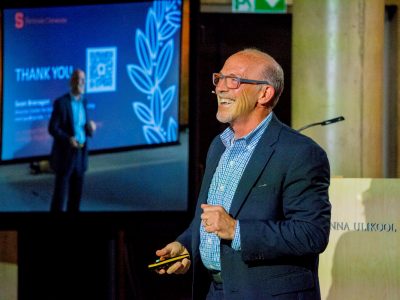Part 2: How 2 Newhouse Students Won the Top Student Creative Advertising Award in the World
“Syracuse University Creatives Win Future Lions Grand Prix with Spotify Sign Language Project,” read the Ad Age headline on June 19, 2024—a prestigious recognition for the S.I. Newhouse School in one of the top trade publications in creative advertising.
Earlier that day, Molly Egan and Marlana Bianchi won the Cannes Future Lions Grand Prix for their artificial intelligence idea for Spotify, created in their Portfolio III course in the Newhouse School, taught by Professor Mel White.
“Winning the Grand Prix in the Cannes Future Lions competition is the most significant award the advertising department at Newhouse has ever received,” says Ed Russell, professor and chair of the Newhouse advertising department. “We couldn’t be prouder of Marlana and Molly’s huge accomplishment, along with their professor, Mel White.”
“We are dedicated to being the best undergraduate advertising program in the country and world, and this is clear evidence we are well on our way,” Russell says.
Mark Lodato, dean of the Newhouse School, says, “What wonderful news! I’m excited for our students and very grateful for the talented faculty that helped guide them toward this achievement.”
Egan and Bianchi’s Portfolio III instructor, White, guided them through the creation of “Break the Sound Barrier,” and her support was crucial to their success. She helped them refine the concept from 10 initial ideas they presented in class and sharpen its final execution.
In class, before providing her students with the competition brief, White taught them how to create innovative campaigns using emerging technologies. In particular, she teaches them to utilize deepfake technology in positive ways to create impactful ideas that connect brands with their audiences.
The Innovative AI Idea Chosen by Spotify: “Break the Sound Barrier”

Egan and Bianchi addressed the competition brief from Spotify, which asked students how Spotify could spread positivity using technology to bring listeners closer to the creators and communities they love. The brief encouraged entries to use new technology and uplift underrepresented communities.
While brainstorming how to answer the brief, they realized music streaming platforms lacked features for the deaf community, making them less inclusive.
To solve this problem, they created an idea that adds deaf sign language performers like Justina Miles to all songs on Spotify, spearheading a music revolution.
They applied deepfake technology to scale deaf performances into all the 300-plus different sign languages for each song on the platform. This idea makes music streaming fully accessible to the deaf community, and it will only be available on Spotify.
Musicians would also have a choice to opt into “Break the Sound Barrier.” When a musician opts in, Spotify will generate them signing with deepfake technology. This will let musicians perform in all the world’s sign languages for the first time, bringing deaf fans closer to their favorite artists than ever before.
In the first article of this two-part series, Egan and Bianchi share the inspiration behind their digital AI idea for Spotify.
“There’s terrific craft to this execution. The name [‘Break the Sound Barrier’] is provocative. The writing in the case, sharp. And you tied it to culture in a way that lets Spotify know: the time to do this is now,” says Avi Steinbach ’14, creative director and writer at Ogilvy. Steinbach is an alumnus of Newhouse’s creative advertising program and is also a first-time Cannes Lions Grand Prix winner this year for “Michael CeraVe,” for which he was involved in every aspect of its creation.
Spotify Chose “Break the Sound Barrier” to Win Future Lions Grand Prix
“The idea that this feature could bring [the deaf community] closer to the artists that they love meets the brief perfectly,” says Tye M. Comer, creative director of Spotify advertising. “Also, the use of deepfake technology—genius. Because I don’t know about the rest of you, but everything that I’ve heard about deepfake technology absolutely terrifies me, right?”
“To take that and to turn it on its head to create something that puts positivity in the world was just wonderful. And that’s the whole point of Future Lions,” Comer said.
Spotify chose the Grand Prix winner based on which idea they want to explore producing. They will collaborate with Egan and Bianchi to find ways to bring “Break the Sound Barrier” to life on their platform.
And the Winner Is…

On the morning of the ceremony, Egan and Bianchi eagerly joined the three other winning teams to await the announcement of the Grand Prix winner on Spotify Beach at Cannes Lions.
Gemma Redgrave, global marketing director at advertising agency AKQA, presented the award with Comer and Chloe Wix, global director of product marketing at Spotify. Redgrave has overseen Future Lions since 2019, advocating for student creativity.
Until that moment, Egan and Bianchi had been sworn to secrecy about their status as Cannes Future Lions winners. With anticipation building, the defining moment of their Cannes experience arrived.
“The Grand Prix goes to… ‘Break the Sound Barrier.’”
“We ran onto the stage, floating on cloud nine. In that moment, our dreams came true,” Egan says.
Story by Molly Egan, a senior in the Newhouse School



